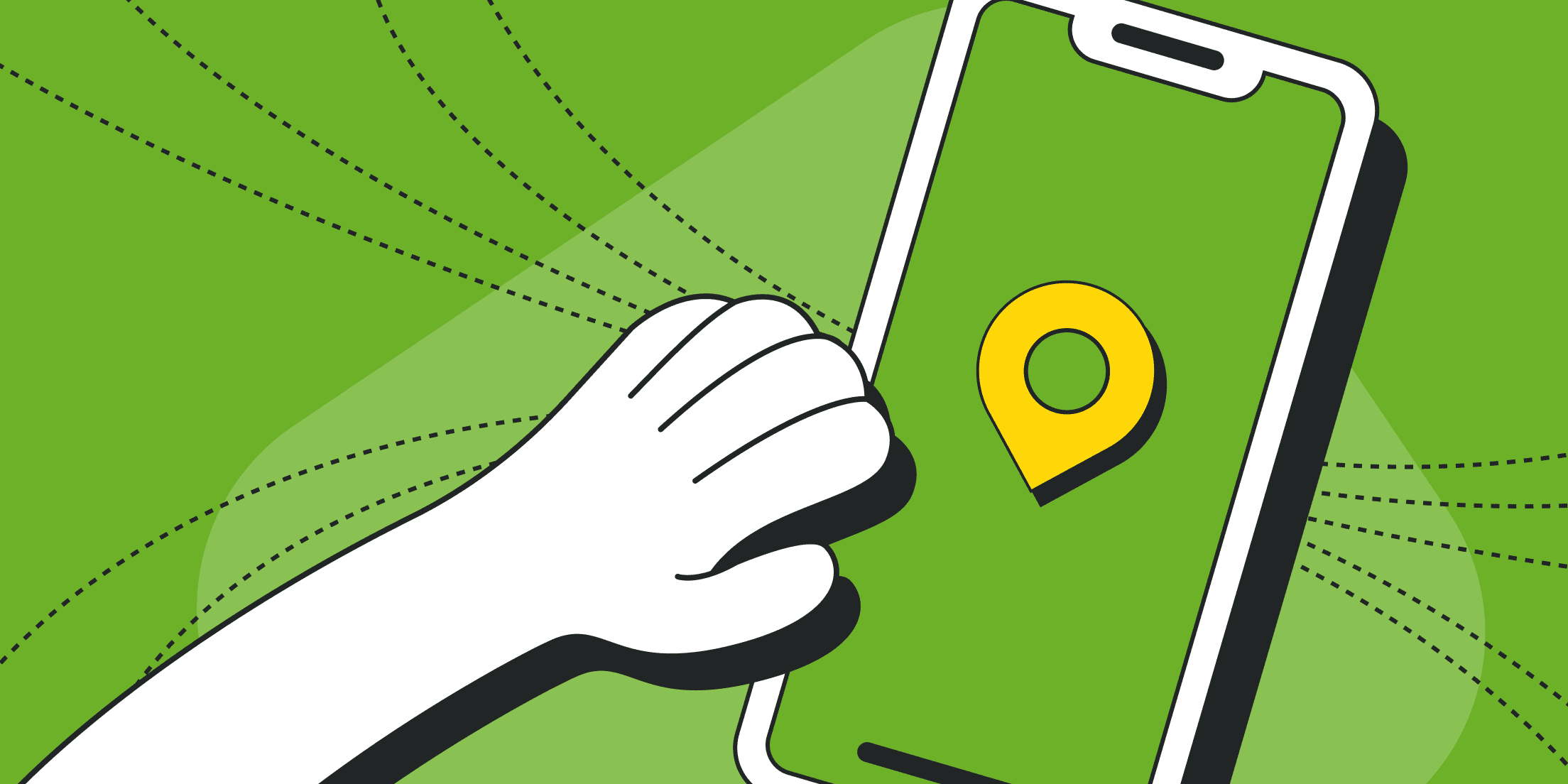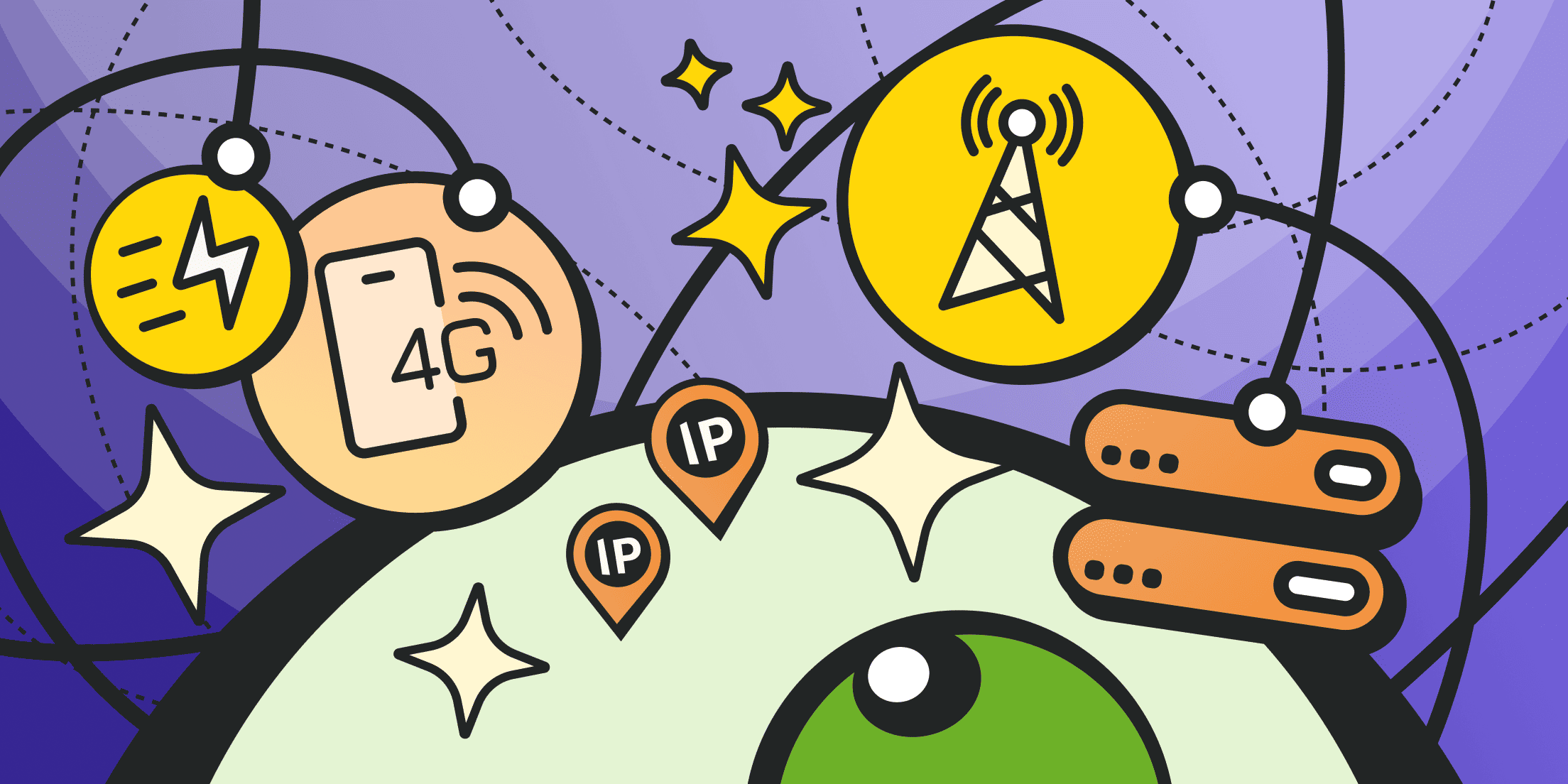Whether it's SEO, data parsing, social media management, or ad testing, you often need to hide your IP address and look like a regular user. This is where mobile proxies come in.
But what are they, and how are they better than other proxies? Why are they used for SEO, e-commerce, and cybersecurity? What are the pitfalls of working with mobile proxies? In this article, we will understand all the nuances of using mobile proxies.
What are Mobile Proxies?
Imagine you've gone online, but instead of your home Wi-Fi or regular ISP, your IP address now belongs to a mobile operator. That's exactly what mobile proxies do – they provide you with IP addresses that are used on 3G, 4G, or 5G mobile networks.
But why is this required? Mobile IP addresses are much more challenging to track and block. Unlike static IPs, which are tied to a device or location, mobile IPs are dynamic – they change constantly, making them more anonymous and reliable for various tasks.
Platforms like Google, Facebook, Instagram, or online stores may be suspicious of standard proxy and VPN services. Mobile IPs, on the other hand, appear to them as normal users connected to the Internet through a mobile network. This makes them ideal tools for SEO, SMM, data parsing, blocking circumvention, and cybersecurity.
How Do Mobile Proxies Work?
Now, let's break down exactly how the magic of mobile proxies works.
- You are connecting to a proxy server.
Your computer, smartphone, or script sends a request through a mobile proxy server, which already uses the connection through the mobile operator. - The request is sent to the Internet from the mobile IP.
Instead of showing your IP address, the mobile proxy substitutes the IP address of the mobile network. This means that sites will "see" you as a regular user surfing the web from a phone. - Sites can't block you easily.
Here's the trick: mobile networks use NAT (Network Address Translation). This means that thousands of users can use the same IP address simultaneously. So, if a site decides to block that IP, it will automatically block many real users. Naturally, extensive services don't want to do this, so mobile IP addresses remain reliable and less prone to blocking. - The IP address changes periodically.
In mobile networks, IP addresses change dynamically. This happens when a user reconnects to the network or simply due to operator activity. Mobile proxies can automatically update your IP regularly, making you even less traceable.
The bottom line is that mobile proxies allow you to safely and anonymously browse the web and perform other tasks that require you to hide or change your IP.
Mobile Proxies
Premium mobile IPs for ultimate flexibility and seamless connectivity.
Based on the number of users connecting simultaneously to the same host, proxies can be of the following types:
- Private mobile proxies are issued to one person only. No one but you is working through that node at any given moment, and all traffic belongs to you.
- Multiple clients can use shared mobile proxies simultaneously. The channel width is shared among all participants, and privacy may be compromised.
Providers can use different approaches and techniques to organize their network of mobile proxies.
Alternatives to Mobile Proxies

If, for some reason, mobile proxies aren't right for you, there are other options. They may be cheaper, faster, or more convenient in certain situations. Let's take a look at what you can replace mobile proxies with:
- Residential proxies. These proxies use the IP addresses of real users, so they look natural to websites and are available in different countries and cities. They are useful for tasks where you need a high degree of anonymity but do not need to change IPs very often (although you can customize the frequency of address changes).
- Datacenter proxies. These proxies work through data centers, making them faster and more stable. Static IPs are also possible. They're perfect for tasks where you don't need to pretend to be a regular user, such as working with bots, automating processes, or testing web applications.
- VPN. While a VPN doesn't change your IP address as often as a proxy, it hides it by routing all Internet traffic through an encrypted server. A VPN may be a good choice if you just need to hide your real IP and protect your data (such as when using public Wi-Fi). But it won't work for parsing, SMM, or multithreaded tasks.
- Tor. This network encrypts traffic and sends it through multiple nodes around the world. Tor is useful if you need maximum anonymity, but it is absolutely not suitable for tasks where speed is essential (e.g., data parsing).
Mobile Proxy Advantages
Mobile proxies have the following advantages over the alternatives:
- There is minimal risk of blocking. Only mobile proxies allow you to perform complex tasks because mobile devices receive IP addresses dynamically from the telecom provider. It is not profitable for anyone to block such IPs – today, this address belongs to one client, and tomorrow, to another. In this way, legitimate users can be inadvertently disconnected. Therefore, even if mobile IPs are blocked, they are blocked for a while (and not very long).
- Operational IP change. Address rotation can be performed at any time, even per request. Addresses can be changed on time or when problems are detected (proxy inoperability). With the right mobile proxy provider, you don't have to pay extra for this option. You just rent a pool of active addresses (ports).
- Request parallelization. The more devices in the proxy network, the more requests can be sent in parallel. This allows you to speed up and simplify even very complex tasks, such as parsing thousands of competitor sites.
- Wide range of locations. Server proxies are often tied to large cities and data center locations. The choice of communication providers is minimal. With mobile proxies, you can virtualize your location to any town and the mobile operator. No one will ever be able to distinguish your requests from those of real clients.
- Compatibility with enterprise software. It really depends on the mobile proxy provider's API capabilities and the availability of ready-made integration modules. For example, Froxy has it all.
Difficulties and Limitations
Mobile proxies depend on the stability and availability of cellular networks. Although ISPs guarantee that their mobile proxy servers will be up and running most of the time, users may occasionally experience some fluctuations in connectivity and speed, especially in areas with erratic cellular coverage.
Unlike server proxies, where you can specify a static IP, mobile IPs change dynamically. Sometimes, this is a plus (more anonymity). Still, sometimes, it is a minus – for example, if you must work consistently with a single account or maintain a connection without interruption.
Proxies based on mobile networks use 3G/4G/5G connections, and while speeds can be decent, they are still inferior to dedicated server channels. Mobile proxies may seem slow if you need super-fast data download. In this case, it's better to pay attention to fast proxies.
Mobile operators do not give out millions of IP addresses but use NAT, grouping many users under one IP. This means that if someone before you has already violated the site's rules, you may get a “spoiled” IP, because of which services will start issuing captchas or temporary blocking.
Typical Use Cases of Mobile Proxies

Mobile proxies are not just a tool for changing IPs but a powerful solution for a variety of tasks. Their applications are extensive, ranging from SEO and marketing to security. Let's take a look at the main cases where they are most useful.
Ad Verification
Marketers spend thousands of dollars on advertising, but they can't always be sure their ads reach their target audience. Often, companies encounter ROI problems (e.g., competitors clicking on ads), incorrect geo-targeting, or differences in how ads are displayed for different regions.
With mobile proxies, advertisers can see how their ads appear to users in different cities and countries. This helps to find hidden targeting errors, identify fraudulent clicks, and analyze the effectiveness of ad campaigns. In addition, mobile IPs allow you to simulate a real user, making the checks as accurate as possible.
SEO and Web Scraping
Search engines such as Google, Yandex, or Yahoo protect themselves from automated data collection by limiting the number of requests from a single IP address. If a script or program makes too many requests in a short period, the site may display a captcha, slow down the output, or block access altogether.
Dynamic IP addresses allow scrapers to operate without restrictions. Since thousands of real users can use one IP in mobile networks, search engines are less likely to block such requests. Mobile proxies allow automatic IP changes, enabling secure data collection, search engine analysis, site position tracking, and competitive intelligence.
The most profitable solution is to use a SERP scraper that works with proxy servers. This way, you can automate data collection and avoid unpleasant consequences such as blocking.
Social Media Management
Social network algorithms (Facebook, Instagram, TikTok) closely monitor user activity and detect suspicious behavior. If a suspicious number of accounts are created or maintained from one IP, there is a high risk of being banned or suspended. This is especially true for SMM specialists, targeting specialists, and entrepreneurs who work with multiple sites.
With the help of proxies, you can safely manage multiple accounts, imitating real users. Such IP addresses change regularly, which reduces the likelihood of blocking. This is especially useful for
- Mass promotion through multiple profiles.
- Automation of actions.
- Developing and testing SMM strategies without the risk of losing accounts.
Worldwide Coverage
5 continents, No limits
Access our proxy network with more than 200 locations and over 10 million IP addresses.
E-commerce
For owners of online stores and marketplaces, tracking competitors' prices, checking product availability, and analyzing consumer demand is essential. However, many sites restrict access to this information by blocking mass requests from one IP or showing users different data in different regions.
With mobile proxies, you can bypass restrictions and get accurate information for market analysis, monitor competitors' prices, and check the availability of goods in specific regions.
Cybersecurity
Cybersecurity threats are everywhere in today's digital world, from identity theft to targeted attacks on businesses. Unprotected connections, static IP addresses, and lack of anonymity can lead to account hacking, data theft, and financial loss.
Mobile proxies help minimize these risks by providing an extra layer of protection, anonymity, and flexibility while online. Let's break down exactly how they're used in cybersecurity, as we believe this is the most critical use case for proxies.
Data Protection
Today, websites and services actively collect user data, track online activities, and analyze IP addresses. This can be used not only for targeted advertising but also for surveillance, digital fingerprinting, and even hacking.
Mobile proxies allow you to hide your actual IP address and replace it with the dynamic IP of your mobile operator.
In addition, proxies allow employees to connect securely to corporate systems by masking their actual location and reducing the risk of data eavesdropping on open networks. Companies can use mobile IPs to restrict access to their systems to specific regions or devices.
Testing of Security Systems
Enterprises and cyber professionals conduct penetration testing (pentesting) to identify security weaknesses in their web resources. Using mobile IP addresses, cybersecurity professionals can test the vulnerability of websites and applications without being blocked by defenses. Proxies enable more realistic testing by simulating real users from different regions.
How Else to Use Mobile Proxies?
Due to their specifics, mobile proxies are simply indispensable for the following tasks:
- Arbitrage. For models to make money from specific user actions.
- Online reputation management. Track reviews, build a positive image, protect reputation, etc.
- Monitor prices and get the best deals. Large retailers may set different price brackets in different regions and countries of presence.
Due to relatively high traffic prices, mobile proxies will not be the best solution for watching streaming video broadcasts or downloading/sharing torrents.
Conclusion and Recommendations

Mobile proxies are a powerful tool that provides access to anonymity, bypassing blocks and working efficiently online. They are ideal for SEOs, marketers, parsers, and anyone who wants to look like a real user online.
The key is to use them properly: work with trusted providers (such as Froxy), set up IP rotation, monitor security, and do not overload requests to the same address. With the right approach, mobile proxies can help you bypass blocks, protect your data, and achieve your goals without unnecessary risk.




